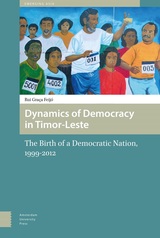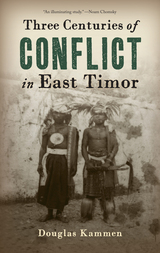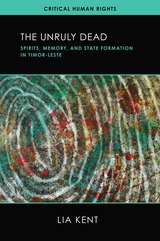3 books about Timor-Leste

Dynamics of Democracy in Timor-Leste
The Birth of a Democratic Nation, 1999-2012
Rui Graça Feijó
Amsterdam University Press, 2016
The Indonesian province of Timor-Leste made international news when it decided to break away from Indonesia in 1999. The decision sparked deadly rampages by pro-integrationist militias, violence that only abated when the UN sent a force to maintain peace and help ease the way to actual independence. This book details the political history of Timor-Leste, both preceding and following the declaration of independence, and it uses the events, consequences, and lessons of that period to help us understand what to expect for similar experiments in democracy building elsewhere in the world.
[more]

Three Centuries of Conflict in East Timor
Kammen, Douglas
Rutgers University Press, 2015
One of the most troubling but least studied features of mass political violence is why violence often recurs in the same place over long periods of time. Douglas Kammen explores this pattern in Three Centuries of Conflict in East Timor, studying that region’s tragic past, focusing on the small district of Maubara.
Once a small but powerful kingdom embedded in long-distance networks of trade, over the course of three centuries the people of Maubara experienced benevolent but precarious Dutch suzerainty, Portuguese colonialism punctuated by multiple uprisings and destructive campaigns of pacification, Japanese military rule, and years of brutal Indonesian occupation. In 1999 Maubara was the site of particularly severe violence before and after the UN-sponsored referendum that finally led to the restoration of East Timor’s independence. Beginning with the mystery of paired murders during East Timor’s failed decolonization in 1975 and the final flurry of state-sponsored violence in 1999, Kammen combines an archival trail and rich oral interviews to reconstruct the history of the leading families of Maubara from 1712 until 2012.
Kammen illuminates how recurrent episodes of mass violence shaped alliances and enmities within Maubara as well as with supra-local actors, and how those legacies have influenced efforts to address human rights violations, post-conflict reconstruction, and the relationship between local experience and the identification with the East Timorese nation. The questions posed in Three Centuries of Conflict in East Timor about recurring violence and local narratives apply to many other places besides East Timor—from the Caucasus to central Africa, and from the Balkans to China—where mass violence keeps recurring.
Download open access ebook here.
Download open access ebook here.
[more]

The Unruly Dead
Spirits, Memory, and State Formation in Timor-Leste
Lia Kent
University of Wisconsin Press, 2024
“What might it mean to take the dead seriously?” asks Lia Kent in this exciting new contribution to critical human rights scholarship. In Timor-Leste, a new nation-state that experienced centuries of European colonialism before a violent occupation by Indonesia from 1975 to 1999, the dead are active participants in social and political life who continue to operate within familial structures of obligation and commitment. On individual, local, and national levels, Timor-Leste is invested in various forms of memory work, including memorialization, exhumation, reburial, and commemoration of the occupation’s victims. Such practices enliven the dead, allowing them to forge new relationships with the living and unsettling the state-building logics that seek to contain and control them.
With generous, careful ethnography and incisive analysis, Kent challenges comfortable, linear narratives of transitional justice and argues that this memory work is reshaping the East Timorese social and political order—a process in which the dead are active, and sometimes disruptive, participants. Community ties and even the landscape itself are imbued with their presence and demands, and the horrific scale of mass death in recent times—at least a third of the population perished during the Indonesian occupation—means Timor-Leste’s dead have real, significant power in the country’s efforts to remember, recover, and reestablish itself.
With generous, careful ethnography and incisive analysis, Kent challenges comfortable, linear narratives of transitional justice and argues that this memory work is reshaping the East Timorese social and political order—a process in which the dead are active, and sometimes disruptive, participants. Community ties and even the landscape itself are imbued with their presence and demands, and the horrific scale of mass death in recent times—at least a third of the population perished during the Indonesian occupation—means Timor-Leste’s dead have real, significant power in the country’s efforts to remember, recover, and reestablish itself.
[more]
READERS
Browse our collection.
PUBLISHERS
See BiblioVault's publisher services.
STUDENT SERVICES
Files for college accessibility offices.
UChicago Accessibility Resources
home | accessibility | search | about | contact us
BiblioVault ® 2001 - 2024
The University of Chicago Press









